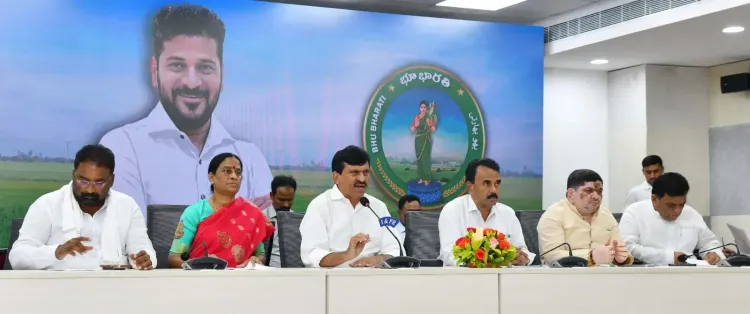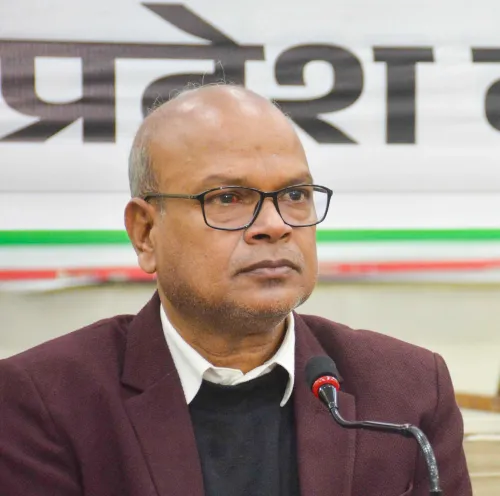Is Telangana Scrapping the Two-Child Norm for Local Body Elections?

Synopsis
Key Takeaways
- Telangana government to abolish two-child norm for elections.
- The decision made during a Cabinet meeting led by Chief Minister A. Revanth Reddy.
- Moves to enhance inclusivity in political participation.
- Similar norms scrapped in other states.
- Upcoming Cabinet meetings to address local body elections and Backward Class reservations.
Hyderabad, Oct 23 (NationPress) The Telangana government has resolved to implement an ordinance to abolish the two-child norm for candidates contesting local body elections within the state. This pivotal decision was made during a Cabinet meeting chaired by Chief Minister A. Revanth Reddy on Thursday.
The Cabinet has sanctioned the removal of Section 21(3) of the Telangana Panchayat Raj Act, 2018, which prohibits individuals with more than two children from running for local body elections.
Minister for Information and Public Relations P. Srinivas Reddy informed reporters on Thursday night that, given the prorogation of the Assembly, a draft ordinance will be forwarded to the Governor for approval to eliminate this section.
The two-child policy was first introduced in undivided Andhra Pradesh in 1994 and was maintained in the 2018 Panchayat Raj Act in Telangana.
This matter was deliberated in the previous Cabinet meeting, where a consensus was reached to repeal the norm.
Several other states, including Andhra Pradesh, have already discarded this regulation.
The Cabinet concluded that the government must proceed in accordance with the advice of legal experts following the interim High Court judgment, which has put a stay on the Government Order (GO) that provides 42 percent reservation for Backward Classes in local bodies, alongside the Supreme Court's decision not to intervene in the High Court's ruling.
Regarding the local body elections, the Cabinet acknowledged that a petition on this issue is set for hearing on November 3. The government will act in compliance with the High Court's directives on that date.
Another Cabinet meeting has been scheduled for November 7 to further discuss and finalize the reservations for Backward Classes and the local body elections.
The Cabinet has also resolved to resume work on the Srisailam Left Bank Canal (SLBC), noted as the world's longest tunnel. The remaining construction will be undertaken utilizing advanced drilling technology.
It has been mandated that the SLBC project must be completed without fail, aiming to provide water to 3.50 lakh acres and supply irrigation and drinking water to areas affected by fluoride in the joint Nalgonda district.
The Cabinet has permitted the use of cutting-edge drilling techniques in place of the tunnel boring machine previously employed for excavation.
The contracting agency has committed to finish the remaining work within the original budget. The Cabinet has authorized the same contracting company to complete the tunnel excavation.
Out of the total 44 km tunnel, 35 km has been excavated from both ends so far. The work was previously halted due to a collapse on February 22, which tragically resulted in the deaths of eight workers.
The Cabinet has approved the application of state-of-the-art technology to excavate the remaining 9 km of the tunnel while preserving the forest, environment, and wildlife.
The target for completing the SLBC is set for June 2028.
The Cabinet also reviewed the swift progression of four super specialty hospitals currently under construction in the state. Officials have been instructed to hasten the building of Warangal Super Specialty Hospital, LB Nagar Telangana Institute of Medical Sciences (TIMS), Sanath Nagar TIMS, and Alwal TIMS.
Furthermore, the state Cabinet has given preliminary approval for the establishment of 1500 MW battery energy storage units. It has directed the Electricity Department to decide on suitable locations for these developments.
The Cabinet has sanctioned the decommissioning of the 52-year-old Ramagundam Thermal Station (RTS-B 62.5 MW unit) in Ramagundam, as its operational term has concluded.
Additionally, the Cabinet has instructed the Electricity Department to draft a future strategy aligned with the state's current power demands and projections for the next decade.










